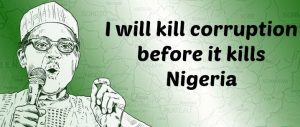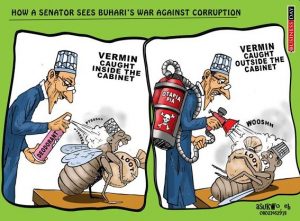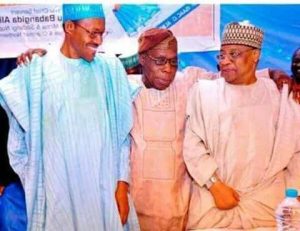Is it possible that the recent travel ban on some 50 political, business and former military leaders in the context of Executive Order 6 is not a standalone practice? This is the subject attracting most attention in political circles in Nigeria where the travel ban is being read as nothing but stage one of a long drawn list of tactics of the current phase of the anti-corruption war.
The speculation is thick enough in the air. The dominant belief at the moment is that the travel ban on about 50 politicians standing trial or under investigation for one alleged infraction bordering on corruption or another cannot be a standalone move. “It would be surprising if that travel ban doesn’t have junior brothers, half-brothers, cousins and so on, all dancing their way into the arena, the travel ban being just stage one”. That was how an intense observer put it to Intervention.

A General’s vow
The speculation has social basis, what with the slogan being that of sparing no one in general and the president’s threat to jail corrupt people in particular. Although the threat may have backfired as the commoner response is the poser: how can he succeed in jailing any big guns when he has not succeeded in jailing the smaller fries on his list, it could still happen that no Sheriff might be spared in the Second term should Buhari get the term. Fortunately and unfortunately, time and target are largely in his favour as the lead prosecutor of the war. This is with particular reference to the classic case of securitization that his pronouncements amounts to. Securitisation in this context means making corruption an existential threat and, therefore, an emergency to be dealt with. What matters in such cases is the pronouncement by someone competent to make such pronouncement rather than the objective truth of the said threat. The element of ‘someone competent to securitize a threat’ in his favour even as he does not have monopoly of securitizing power in a world in which the media and NGOs have equally got such securitizing powers. It is that dilution of the power to securitise that has annulled the major criticism of securitization theory to be a manifesto for the status quo in spite of its academic radicalism.
The submission of the names of winners of the primaries in the respective political parties to the Independent National Electoral Commission, (INEC) has closed for the presidential and the National Assembly by now. It would take time before Nigerians get to know who made it or did not. That is whether it is from this point the next EO6 tactic on the list, whatever it is, might unfold. Some people are not ruling out disqualification in one form or another from the options.
Reception to the travel ban has been such a mixed bag. Rescind it because it is relapse to dark days of military dictatorship would seem to be a fair summary of the reception at the elite level. But that is the elite and their newspapers. Away from the newspaper headlines, the appearance of certain names on the list is the most joyous news item since 1999 in many communities. And this spasm of joy is not limited to the North or South, Christians or Muslims. It speaks to the complexity of the phenomenon of corruption and its politics in Nigeria.

A cartoonist’s imaginary of the interrogation of the anti-corruption war
On the hand, the courage to frame it as an existential threat and to go on an offensive against the said threat by naming, shaming and putting suspects on trial is bound to sell or attract hand clapping. What makes it to sell is the power relationship that corruption expresses: it is a case of the strong saying to the weak to go to hell. So, when anyone comes to say, hey, Mr. Strongman or Madam Strong woman, bring back what you have taken, all the victims of Mr. Strongman or Madam Strong woman are in automatic solidarity with such heroism. On the other hand, the perception that the anti-corruption war has become the president’s only hook-up for getting out of a very bad electoral disadvantage is undermining the anti-corruption rhetoric. In the current anti-corruption war in Nigeria, the prosecutor – the ruling party, President Buhari and the Economic and Financial Crimes Commission, (EFCC) have, individually and collectively, been heavily criticized for selectivity and for condoning corruption of party members.
Although realists think the ruling party would be foolish not to use the anti-corruption war against the opponent because that is what everyone else did since 1999, many are disappointed in the president being seen to be personally neck deep in the practice of selectivity, contrary to the image of him circulated around. Those who crave for a hard nosed treatment of the corruption boil rethink when they see that the president is aware of certain cases but appear to turn the other eye.
The second snag with fighting corruption in Nigeria is the very slow trial process while the third is the antiquity of the laws underpinning the charges. Surprisingly, none of the EFCC chiefs since 2003 has made this a key issue in the successive anti-corruption wars.
Lastly, the instability of the public mood in Nigeria as a threat to fighting corruption! Nigeria is perfectly comparable to that community which applauded the son who tied his father and left him in the sun as punishment for the abomination of having sex with his daughter in-law. As everyone in the community heard the story of what the culprit did on their way to the farm in the morning, they applauded the son and the punishment. But the mood changed completely in the evening when, on their way back from the farm, they still saw the father tied to the ground. Does he want to kill the father? now became the new refrain. That’s how Nigeria is. As they read newspaper headlines of who has stolen what, they cheer the prosecutor on: jail him, jail him. But few hours after that, the mood could change. It is a national culture that requires being built into the anti-corruption menu.

As yet another cartoonist sees it
For the first time in Nigeria, corruption appears to be the single most important factor that might decide victory in a presidential election and even leadership recruitment, crime and punishment and the definitive criterion in scoring leadership, governance and credibility. How great would it have been if this became national consensus without controversy! Unfortunately, that is not the case. It is not the case in that whatever attractiveness the Buhari regime’s effort in fighting corruption is undermined by the claims that the Buhari political personality is the anti-thesis of Nigeria remaining one.
For all that Nigerians may care, this could be the desperate propaganda of a desperate wing of the power elite. The question is, what if it is not?

When espirit de corps goes on AWOL
First of all, the claim is made by a former military leader and a Buhari senior in their career and in power politics. Secondly, the president continues to reinforce the allegations they level against him by the very pattern of the top level appointments he makes.
Is it likely that the Nigerian media, the civil society and the international community can secure the anti-corruption war from the politicization around it towards entrenching the existing areas of consensus against corruption? A particular Foundation is already on the move in this regard in terms of mainstreaming anti-corruption and accountability consciousness among the population. It is based on its own study and conclusion that substantial part of the development impasse in Nigeria is traceable to corruption. But its strategy cannot produce impacts in relation to the danger of a stalemate the combatants in the current politics of corruption could force, consciously or otherwise, if care is not taken. Is the mythical international community going to be firm and early enough against this probability? Lastly, who is going to do something about this paradox of election, (democracy) posing a real threat to Nigeria every four years?
In 1978, intellectuals of the then National Party of Nigeria, (NPN) mainly Adamu Ciroma and Chuba Okadigbo, all of them now late, came up with the idea of rotation or zoning as a formula for accessing power among the contending regions. This has taken roots in the Nigerian political process and taken off the heat considerably. But zoning has come with its own stability threatening problems. President Buhari and Atiku Abubakar who are the leading candidates in the impending election are all northerners, all Muslims. Yet, the country is not out of fear of a stalemate. The country must, therefore, be in need of another set of intellectuals to rework the process. It must be embarrassing to many that every four years, outsiders must come and reconcile the Nigerian power elite on how to conduct elections without breaking heads. Yet, it is not elections contested by vastly different ideological interests. Haba!




























